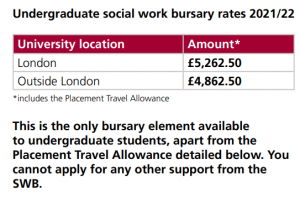Grants, bursaries, loans and scholarships! It can be so overwhelming starting university and wondering how you’ll be able to afford to support yourself whilst studying. Bournemouth University offers two bursaries to students that are eligible to coincide with your student loan.
The first one I’m g oing to run through is the BU Maintenance Bursary. I’ve received this one since the first year of university, and it’s really helpful for my weekly food shop. You receive it in terms of a pre-paid card that gets topped up automatically by the bursary team with £122.22 each month between October and June. The amount is fixed and gets added the first week of each month when you’ll receive an email and or text confirmation to let you know the credit has been added.
oing to run through is the BU Maintenance Bursary. I’ve received this one since the first year of university, and it’s really helpful for my weekly food shop. You receive it in terms of a pre-paid card that gets topped up automatically by the bursary team with £122.22 each month between October and June. The amount is fixed and gets added the first week of each month when you’ll receive an email and or text confirmation to let you know the credit has been added.
You cannot top up the card yourself, withdraw from an ATM or transfer money to another account, but you can spend it like a debit card at many retailers, both online and in store. The BU Bursary card has a cashback system, where they partner with retailers to offer cashback for around 2%. I found this really useful as it allows me extra credit for just spending money at places I’d usually shop at, like New Look, Sainsburys, Waterstones, Marks and Spencer’s and even restaurants such as Pizza Hut and Toby Carvery.
 The bursary is means tested and to be eligible you are re-assessed yearly. The requirements include being registered as Home for Fee Status, living in England as a resident for 3 years prior to the start date of your course, apply as a new student on an undergraduate course, be studying your first degree and have a family income of £16,000 or less per year to qualify for the bursary. I applied as an independent student to Bournemouth University and Student Finance, therefore was automatically assessed and contacted to be awarded the amount. You do not need to apply for this bursary as the team will contact you if they believe you are eligible. As it is a bursary, it does not need to be repaid, and you can spend it on essentially what you wish.
The bursary is means tested and to be eligible you are re-assessed yearly. The requirements include being registered as Home for Fee Status, living in England as a resident for 3 years prior to the start date of your course, apply as a new student on an undergraduate course, be studying your first degree and have a family income of £16,000 or less per year to qualify for the bursary. I applied as an independent student to Bournemouth University and Student Finance, therefore was automatically assessed and contacted to be awarded the amount. You do not need to apply for this bursary as the team will contact you if they believe you are eligible. As it is a bursary, it does not need to be repaid, and you can spend it on essentially what you wish.
I have personal experience of friends who receive the care leaver’s bursary. The Care Leaver’s Bursary is a great way of BU to recognise the diverse backgrounds their students come from and how some students may find their chances of a higher education are more difficult than others from a more privileged background. A lot of care leavers wouldn’t get the financial support that some families can provide, therefore, as a social work student, and having friends that have come from the care system, this one is a particularly important bursary I believe BU offer. To be eligible you must have been in care for a period of 3 months or more in the last 5 years, be registered as Home for Fee Status, have lived in England as a resident for the 3 years prior to the course start date, be a new student studying an undergraduate course and have a household income of £25,000 or under.
This bursary, again, is paid in the sa me way as the BU Maintenance Bursary. The exception is that you receive £3,000 a year up to £9,000 for a 3-year course, or £12,000 if you include a foundation year. The £3,000 is spread evenly across 9 months from October-June on a pre-paid card and can be spent again, on anything you like, in store or online, except for withdrawing from an ATM, or transferring the money to another account. You can claim 2% cashback on selected retailers also. All the BU Bursary cards look the same, therefore it is discreet at which one you are receiving, allowing you to not be singled out publicly for being a care leaver or being on a low income.
me way as the BU Maintenance Bursary. The exception is that you receive £3,000 a year up to £9,000 for a 3-year course, or £12,000 if you include a foundation year. The £3,000 is spread evenly across 9 months from October-June on a pre-paid card and can be spent again, on anything you like, in store or online, except for withdrawing from an ATM, or transferring the money to another account. You can claim 2% cashback on selected retailers also. All the BU Bursary cards look the same, therefore it is discreet at which one you are receiving, allowing you to not be singled out publicly for being a care leaver or being on a low income.
As a social work student, I am eligible for the social work bursary also, throughout my second and third year of studies. They are awarded in return of working 70 day and 100-day placements during this time, therefore unable to support yourself financially through paid part time work. This bursary isn’t paid on a pre-paid card but rather through your bank account at the start of each term, like a student finance loan. You are eligible if you apply and are offered an allocated capped place by BU at the end of your first year of study. There are limited capped places, however, a majority of those on the course receive them, and it is to my understanding BU offer to those who achieved academically the highest grades in first year. Usually, everyone receives one as there are just enough capped places to students, however sometimes this isn’t the case. The bursary is not assessed on household income and does not need to be repaid. The amount awarded each year is £4862.50 which includes a contribution towards your placement travel costs (£862.50) for full time students. This travel contribution is not capped, therefore if you do not receive the full £4862.50, you may still be entitled to apply for the travel allowance.
For me, the BU Maintenance Bursary has be en crucial at allowing me to afford my grocery shop weekly. I do not need to worry about how I will pay for food each month as this covers more than enough for my weekly supermarket shop, taking the pressure of needing to afford the necessities whilst studying. The Social Work Bursary has been the most helpful since finishing first year and being awarded it. It allows me to pay my mortgage and bills each month without worrying about my student finance assessment. These two bursaries combined take the pressure off me as a mature student, being able to afford the basics to survive whilst at university, such as mortgage payments, household bills and grocery shops. Without having access to these bursaries that do not need to be repaid, I am unsure how I would manage the cost of living, student loans and studying full time as a student, therefore they have given me access to higher education, which is particularly important to my future aspirations.
en crucial at allowing me to afford my grocery shop weekly. I do not need to worry about how I will pay for food each month as this covers more than enough for my weekly supermarket shop, taking the pressure of needing to afford the necessities whilst studying. The Social Work Bursary has been the most helpful since finishing first year and being awarded it. It allows me to pay my mortgage and bills each month without worrying about my student finance assessment. These two bursaries combined take the pressure off me as a mature student, being able to afford the basics to survive whilst at university, such as mortgage payments, household bills and grocery shops. Without having access to these bursaries that do not need to be repaid, I am unsure how I would manage the cost of living, student loans and studying full time as a student, therefore they have given me access to higher education, which is particularly important to my future aspirations.


 The low down on student loans
The low down on student loans All you need to know about applying for the NHS Learning Support Fund
All you need to know about applying for the NHS Learning Support Fund 2020 – the challenging yet rewarding year for the student nurse
2020 – the challenging yet rewarding year for the student nurse








